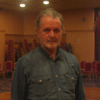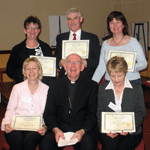CHURCH OF IRELAND CONFERENCE
RESPONSE TO THE ADDRESS OF DR. GEORGE CAREY,
ARCHBISHOP OF CANTERBURY
BY MOST REV SEÁN BRADY
ARCHBISHOP OF ARMAGH
18th March 2000
I congratulate the Church of Ireland Diocese of Armagh and Archbishop Eames on this St. Patrick’s Tide Conference. I am thankful for the gracious invitation to come here and speak which I am very happy to accept. I bring good wishes from the Catholic Church and I pray God’s choicest blessings on your Conference and deliberations.
I gladly join in welcoming Archbishop George Carey. Some years ago I had the pleasure of meeting Archbishop Carey. That meeting took place in Rome, in St. Paul’s within the Walls. I am pleased to meet him again today, within the walls of this historic city of Armagh, and to have this opportunity to speak in response to his very interesting, challenging and stimulating paper. I just want to pick up on a couple of the many points which Dr Carey has made.
Archbishop Carey took us back eleven weeks to the celebration of the beginning of the Third Millennium of the New Era. I was very happy that he was able to be in another St Paul’s, St Paul’s outside the Walls in January for the inauguration of the Great Jubilee there. All of these celebrations remind us that, in Christianity, time has a fundamental importance. The history of salvation unfolds within time. That history culminates in the fullness of time in the Incarnation and its goal is the glorious return of the Son of God at the end of time. So we face future time with confidence.
CONFIDENCE IN THE POWER OF GOD
I was pleased to hear Archbishop Carey speak, first of all, of confidence in an age of change. He stressed the need for a confident faith nurtured in a theological vision of the awesome power of God. Patrick, whose feast we celebrated yesterday, despite describing himself as a sinner and the most rustic and least of all the faithful, had that confident faith. It was a confidence, born not of his own abilities, but based on the awesome power of God.
Confidence and confidence-building are crucial issues here in Northern Ireland right now. We look to institutions to build confidence and they can play an important part. We also speak of confidence-building measures. However genuine-confidence building depends on people. Confidence implies an attitude of trusting in, or reliance on, something or someone. Confidence-building is based on building up trust between people. Further progress can come about through the restoration and deepening of trust within the political process, certainly, but all sections of our community must play their part.
As the Irish Catholic Bishops’ Conference said earlier this week: “The task of building trust in a divided society is always difficult. No one should expect it to be otherwise. However the expectations of the younger generations and the immense progress which has been made in recent years should encourage all those involved in the political process to remain firmly focused on the future and to do all in their power to restore hope and confidence to the whole community”.
I hope that throughout this special year of a new century there will be many occasions when we, as Churches, can continue to work together and to build up confidence among our people. That is one of the reasons why I am particularly happy to be here today and to speak in response to Archbishop Carey. There was a encouraging event, I believe, recently in the Diocese of Clogher. Certainly I look forward very much to welcoming Bishop James Mehaffey to speak in our Cathedral on the eve of Pentecost and I hope that some of you may be able to take part in that Inter-Church Service of Prayer for guidance for all of at the dawn of this new Millennium.
Young People
I was especially interested in Archbishop Carey’s remarks about the idealism, faith and hope of young people. The Church needs the energy, enthusiasm and youthful ideals of this generation in order to make the Gospel of Life penetrate the very fabric of our society.
We also need to be conscious of and respond to the needs of these young people. The age of youth is a time of idealism and hope; it is also a time of uncertainty and restlessness. It is a time when confidence needs to be nurtured and supported. It is a time when young people become increasingly aware of their identity and their gifts and talents. In youth ministry we come into contact with young people at a time when they are searching for a way of life which both makes sense of their experience and which turns them towards an adventure, an adventure in which they can pour out their energy and find expression for their idealism.
The Church, at the beginning of this New Millennium, is challenged to journey with young people on this adventure, as they respond to the call of the Gospel and become co-creators of the Church of the Third Millennium. Changing times, though, demand new approaches. What worked for one generation will not necessarily guarantee success for the next. Changing times demand creativity and imagination.
Archbishop Carey has referred to the pace of change in our world. This pace of change will only increase as we continue our journey into the 21st century. There is a real danger in many fields that what was once alive and vibrant, will quickly become dated and obsolete. Nowhere will this happen more rapidly than in the field of youth ministry. In the words of the poet, T. S. Elliott:
“…last season’s fruit is eaten
And the fulfilled beast shall kick the empty pail.
For last year’s words belong to last year’s language,
and next year’s words await another voice”.
(Little Gidding in four quartets)
INTERPRETING THE “SIGNS OF THE TIMES”
Each generation of leaders in the field of youth ministry has been faced with the same challenge. That challenge is to be a voice that interprets the unchanging message of the Gospel into a language that captures the imagination and commitment of young people.
With what voice then are we challenged to speak to young people in this new age? It will only be possible to capture their ears and their hearts if we speak with the voice of one who has become a trusted travelling companion on their journey of life and faith.
GOALS FOR YOUTH MINISTRY
It is important to set goals for youth ministry. In my opinion one of these goals should be to draw young people to a responsible participation in the life, mission and work of our faith-communities.
We can do this by:
· Proclaiming the good News of Jesus Christ through witness and word to young people.
· By enabling young people to live as disciples through providing opportunities for them to engage in service, ministry and leadership.
· We can do this especially by being involved in the work of peace and reconciliation. In our own divided community, our ministry to youth will address the hurt and brokenness of our community. It will constantly call us to engage in the task of reconciliation. I believe that young people in our Churches have a critical role to play in the process of promoting peace and reconciliation and the building of a new society in Northern Ireland. This is one of the great tasks that faces all our Churches in the immediate future.
It is important to promote a sense of pride in young people in their identity as followers of Jesus Christ. When this takes place their commitment and enthusiasm are considerably enhanced.
We are called to respond to all the young people of the community, not just the ones who still attend our programmes and our liturgies. We recognise the wide variety of gifts and approaches that can be used in the community’s outreach to its young people.
CELEBRATING AND AFFIRMING OUR STRENGTHS
A temptation in all aspects of ministry and Church life is to complain about what is not happening. It is important to celebrate the abundance of gifts in every community. All the efforts, no matter how small or indeed successful they may seem to us to be, should be affirmed. The possibilities and the resources, in our community, that can work together for our young people, should be recognised.
Vincent Donovan in his book Christianity Rediscovered challenges us:
“In working with young people…do not try to call them to where they were, and do not try to call them to where you are, as beautiful as that place might seem to you. You must have the courage to go with them to a place that neither you nor they have ever been before”.
WHAT WE HAVE IN COMMON
Archbishop Carey referred to how much we have in common; Sacred Scripture, the Creed, prayer, sacraments, 1000 years of common history. The ecumenical charter proposed by the Second European Ecumenical Assembly at Graz asks that our lives actually and accurately reflect what we have in common.
Dialogue brings home to us how much we have in common. The dialogue carried out in the Anglican Roman Catholic International Commission has done important work. I hope that its work can continue.
Closer co-operation among the Christian Churches is an urgent requirement at this time. That co-operation will be most fruitful if it is based on generosity, humility and respect, especially respect for people in the place where they are, respect for teachings and universal disciplines.
INCREASED CO-OPERATION
When people meet and really know each other as fellow believers in Jesus Christ, they are able to appreciate and reverence each other, to thank God for the work of the Holy Spirit in their lives. The task of reconciliation is immense. It is going to require increased levels of real inter-Church relationship and co-operation if it is going to get anywhere. This will be needed at all levels but especially at local level. What is required is a sustained conversation about the divisions that exist, about the reasons for their existing and about ways of bridging them that will contribute to healing them.
As we reflect on the positive developments of the recent past, we do not lose sight of the challenges which lie ahead. As we do so we turn to the God of hope, the God of all consolation, from whom every blessing comes. We gladly join with all our Christian brothers and sisters in prayer for the day when God will turn our mourning into joy. We commit ourselves to use only helpful words. Let us be kind-hearted to one another and forgive one another as God has forgiven us in Christ.





